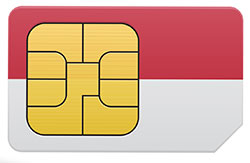Pennies from Heaven (Chinese Coin or Pis Bolong) in Bali
1 April 2008Distinctive Chinese coins with a small square hole in the middle have been the basic unit of currency in East Asia for almost two thousand years. In Bali these "pennies" took on an integral role not only in trade and commerce, but in true Bali style they became an indispensable part of the culture's unique ceremonies and offerings.
Until the advent of mass tourism in the 1970s, Bali was predominantly a cashless society, a subsistence economy where the essentials of life were either grown, made, or bartered for. Nonetheless, one form of cash played, and continues to play, a key role in Balinese life. It is the pis bolong, the ancient form of Chinese coin, the currency of petty trade in The East Asian religion for almost two millennia.
Cast from copper alloy with a square hole in the center,pis bolongare an indispensable component of many Balinese Ceremonies. One or two coins are included in almost all offerings, handfuls are tossed into the flames at cremations, large quantities are used to fashion cili, small, elongated statues representing a particular goddess.
First used in China in the sixth century BC, "Chinese Coin" were cast by pouring molten copper or bronze into a series of branching channels - a literal, albeit inverted, money tree. Pis bolong appeared in Bali as early as the seventh century. An inscription uncovered in the village of Sukawana suggests that by the late ninth century the coins were already being used in Bali Hindu rituals.
In Java and Bali they became the "pennies" of the economy, with all coins having equal face value and one coins referred to as "one cash". The hole in the center had a utilitarian purpose: coins were hung on a string and counted off as required.
Though all "Chinese Coins" are similar in shape and inscription, they were, in fact, manufactured throughout East Asia. Those made in Java tend to be of coarser quality than coins from Vietnam, Korea, or Japan, but one feature found on many Japanese coins makes them highly sought after in Bali. Though the face of the coins carries standard Chinese Language ideograms, the reverse side sometimes carries the image of a figure taken from the mythic Mahabharata tales.
Some Balinese believe that performing sacred rituals using the pis bolong inscribed with figures of the Pandawa family of aristocratic warriors grant the owner noble characteristics in Hindu epic. A pis bolong with an image of the handsome Arjuna (pis Arjuna) will help its owner attract women, while the pis Tualen will grant its owner wisdom.
Considering the importance and multiple uses of Chinese coins, in Bali demand now far outstrips supply. Manufacture of Chinese coins in Java is presumed to have ceased at the end of the colonial era. Although it is possible to recycle coins, the growing frequency and increasing lavishness of Bali Hindu rituals have resulted in a steady decline in availability. Besides the traditional uses in public ceremonies and appeal to private collectors, the booming export handicraft industry has created a vibrant market for wooden statues of Hindu deities covered in coins. One statue may require hundreds or thousands of coins, further reducing the quantity available for offerings and ceremonies.
To overcome this shortage, Balinese have begun to use bank notes as substitutes for pis bolong. Sesari, the component of an offering taken by the priest or Pemangku (lower-level priest) as payment for officiating at a ceremony is now generally composed of rupiah notes.
Since, in modern Indonesia, Chinese coins are not legal tender, some organizations are attempting to maintain the authenticity of Balinese rituals by fashioning their own pis bolong. In the late 1980s a high-castle Balinese who was, at the time, the Indonesian government minister for mines initiated the production of modern pis bolong. Although the new coin is rougher and not has shiny as the old, Balinese have no other choice but to use pis bolong baru if they wish to follow tradition.
The newly established Balinese Heritage Trust has developed a program to produce new pis bolong for use in ceremonies. However, unlike the low-quality copper-or even lead-of colonial Javanese coins, those produced by Bali Heritage Trust use an alloy comprised of five elements: tin, bronze, iron, silver, and gold, which carry a ritual significance similar to the wayang figures on the old Javanese coins. Though manufactured using modern casting techniques, production of these coins requires that an elaborate pasupati, blessing ritual be carried out beforehand.





















